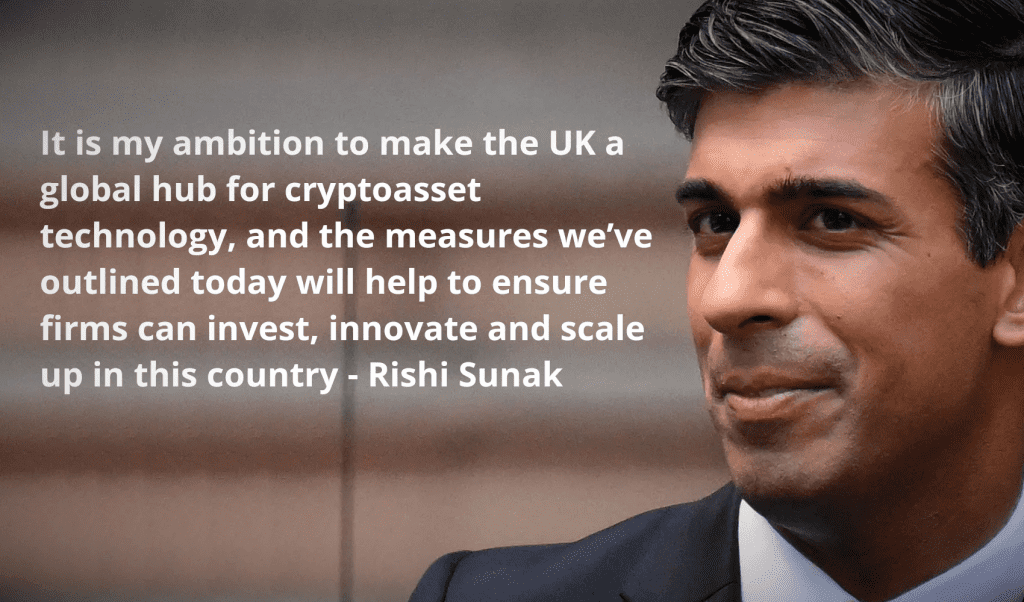Earlier this week one of Silicon Valley’s largest VC firms Andreessen Horowitz announced it would be opening an office in London for their a16zCrypto arm. In this article we will look at how well positioned the UK is relative to the rest of the world to become a fintech capital and hub for the blockchain sector.
Regulation
The current prime minister (like our president) Rishi Sunak has been vocal in his support of the blockchain sector.

He comes from a finance background and previously worked at Goldman Sachs and a number of hedge funds.
While the intention to encourage innovation are clear the regulations are legal framework for blockchain developers in the UK are somewhat murky. Following Brexit the UK needs to stimulate the economy but regulations are still very much a work in progress.
On the 1st February 2023 HM Treasury announced plans to reform cryptoasset regulations which included a time limited exemption for FCA (Financial conduct authority) registered firms to carry out promotions while it is being introduced.
The government expects that this exemption will significantly widen the pool of cryptoasset businesses that can communicate their own promotions, incentivise cryptoasset businesses to be based in the UK and be AML regime compliant, and, crucially, fulfil the objective of the planned regulatory regime to promote innovation, enhance consumer protection and ensure that cryptoasset promotions can be held to equivalent standards as promotions of financial services products with similar risk profiles
Government Approach To CryptoAssets
The wording highlights the ambition to create a regulatory framework with similar standards to tradfi ensuring AML compliance while still promoting innovation.
From a taxation perspective things are still being figured out too and there is an open consultation around DeFi lending & staking currently. For corporate entities any profits will be subject to corporation tax and potentially there are capital gains tax implications on cryptoassets.
A few years ago I spoke to someone involved in high frequency trading on centralized exchanges who thought they owed more money in tax than actually existed in GBP sterling because of a suggested taxation charge every time a trade between two digital assets took place. There is obviously some ambiguity and risk involved in the lack of clarity around how cryptoassets are regulated and taxed.
For more information on the governments evolving regulatory and taxation framework check the cryptoasset manual: https://www.gov.uk/hmrc-internal-manuals/cryptoassets-manual
Banking
In 2018 I had the displeasure of trying to setup a corporate bank account for a registered UK company involved in crypto. This basically involved me walking down a high street of banks and getting told the same thing at every one “we can’t give you a bank account because it is beyond our appetite for risk”.
The problem is that banks frequently get fined for being involved in financial crimes and not conforming with AML regulations. With firms involved in digital assets the banks have no way of understanding what their customers are doing and if they are inadvertently enabling someone sending Bitcoin to terrorists.
This is a ongoing problem for the UK blockchain sector. There have been instances of both legitimate companies and individuals having bank accounts shut down at large banks simply for using fiat on/off ramps.

This has led to a situation where corporations will either setup a generic holding company and not declare their involvement when applying for an account or explore the various offshore banking options. Neither is ideal and more needs to be done to ensure banks are protected and encouraged to offer accounts to cryptoasset businesses.
Personnel
There is a vibrant community of blockchain developers in the UK. Here are some noteworthy organisations where you can find talented individuals:
- Encode Club – Run hackathons and training camps around web3 technologies
- Tech Educators – Norwich based bootcamp for web3 devs
- Techstars – Global accelerator with a London office
The academic environment is world class with some of the best universities in the world and also Oxford.
There are plenty of events, mainly in London, where people in the blockchain sector get together. Meetup is a good place to start if you want to get involved.

Most of the devs that I know work remotely with global teams. There aren’t a huge number of corporate entities with London offices that I am aware of and we are yet to see successful unicorns like Coinbase & OpenSea emerge out of the UK scene.
Travel & Food
London has good airports which are well connected to the rest of the world. It’s relatively expensive for a city but so are other major cities in developed nations. Public transport get’s a bad reputation but the underground trains across the capital and overground lines elsewhere tend to be efficient and effective, avoid at rush hour. We have uber and a reliable taxi network as well.
For anyone thinking about moving to the UK the biggest concern is probably not regulations but how bad is the food? English cuisines gets dunked on because the local cuisine doesn’t compare to French or Italian, which is fair.
However diversity is beautiful and you can get cuisine from all around the world delivered to your door in London. If you go to a tourist trap pub in an inland city and order fish and chips, that’s on you.
If you want a recommendation try seven dials market and the conveyor wine and cheese for a uniquely British fusion experience.

Competition
Dubai
It wasn’t long ago that I heard people talking about moving from the UK to Dubai because of their zero tax policy on crypto and competitive regulatory environment for firms.
On June 1st a new corporate tax rate of 9% came into place which may offset some of the advantages of this crypto friendly region. The taxation and regulatory framework is still as competitive as anywhere else in the world and the government has been overwhelmingly positive in relation to digital assets.
As the world moves on from fossil fuels, middle east nations will need to encourage and foster alternative economies which will open up opportunities for founders.
US
Silicon Valley should have been ground zero for everything crypto. For decades it has dominated the web2 scene with VC’s powering the rapid evolution of social networks and mobile applications.
However the regulators seem to be self-sabotaging a future trillion dollar industry. The SEC has adopted a legislate through enforcement policy which is going to have long term negative implications for innovation.
On the other side of the country New York is home to the worlds largest financial markets and has a schizophrenic attitude to how they treat crypto businesses.
Even with the torture of regulators I still spend more time on calls with people based in the US than I do with Europeans and Asians combined. America is the global leader in software development which encompasses the vast majority of cryptoasset products and services.
Switzerland
The city of Zug has been branded as “Crypto Valley” amid a push from government to encourage the blockchain sector. Over half of the countries 1000~ registered startups are based in Zug.

Unfortunately to register a business in Switzerland you need to have at least 100,000 CHF ($111k USD) in share capital and one of the managers must be of Swiss origin.
Switzerland has a long history of harbouring financial innovation in the banking sector. The governments positive attitude towards crypto means this is likely to continue as financial technology evolves.
Hong Kong
Now back under full control of the CCP Hong Kong is regarded as a gateway to China. Every few years we get a new narrative about China banning Bitcoin but there is evidence that policies are changing.
Earlier this month the Hong Kong Monetary Authority called on banks to provide services to cryptocurrency firms, while the Securities and Futures Commission announced that licensed crypto platforms would be allowed to serve retail customers.
Crypto exchanges Huobi and Gate.io have applied for virtual asset licenses in Hong Kong, with Huobi becoming the first member of the Hong Kong Virtual Assets Consortium. I think it’s somewhat likely, based on speculation alone, that Binance will follow suit.
As China emerges as the worlds leading global power and BRICS nations move away from using the USD as a reserve currency, Hong Kong could play a major role in the migration towards digital assets.
Conclusion
The UK, like every other nation state, is still trying to figure out how to regulate and tax cryptoassets. Communications from politicians have been overwhelmingly positive but this is yet to be backed up by a firm legal framework for founders to know where they stand.
The global economy is evolving into a competitive arena where founders have the option to setup their businesses at home or abroad. London needs to move fast and work with the blockchain industry if it is to become the Silicon Valley of Crypto.
London is a hub for fintech already with lots of startups growing out of the square mile, which is home to some of Europe’s largest banks. There is potential to create the next generation of the financial industry if the government can provide regulatory clarity and a competitive business environment.
Currently it seems like we are dipping a toe in the water and talking the talk rather than going all in on innovation and really making London attractive to founders at home and abroad.
All founders want is to know is that they aren’t going to be sent directly to jail or end up with a ridiculous tax bill for writing code. Tell devs what they can and can’t do specifically, as 99.9% of people want to work in good faith.
If we can put a regulatory and tax framework in place that is easy to understand and comply with then it can potentially be seen as a positive factor in stark contrast to other countries aggressive regulation through enforcement.
Eventually everything will move to digital assets and blockchain technology is the best suited solution for that purpose. The sector will grow in due course and the countries that push for innovation will benefit in a competitive global economy.


